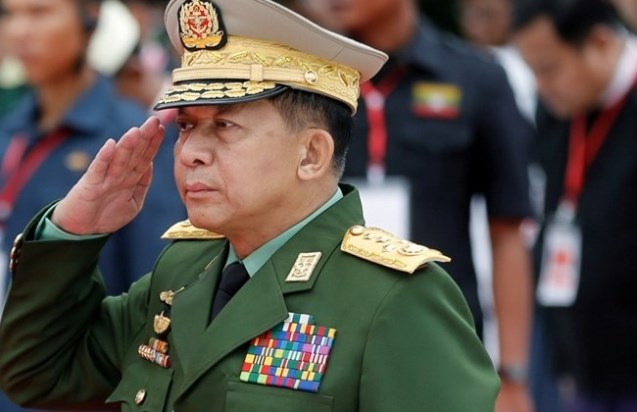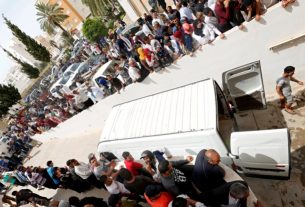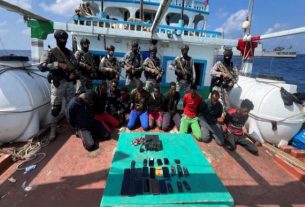Two years after seizing power in a coup, Myanmar’s military leaders have extended the country’s state of emergency for another six months.
The move on Wednesday would likely delay elections that the military government had pledged to hold by August.
“Sovereign power of the state has been transferred to commander in chief again,” acting President Myint Swe said, referring to coup leader Min Aung Hlaing.
State broadcaster MRTV said the National Defence and Security Council had granted Min Aung Hlaing’s request to prolong the state of emergency declared when the army overthrew Aung San Suu Kyi’s democratically elected government on February 1, 2021.
Myanmar’s military will “work to hold elections”, MRTV quoted Min Aung Hlaing as saying. “Our government will work to hold elections in every part of the country so as the people will not lose their democratic right.”
He did not provide a timeline for the polls, which cannot be held during a state of emergency. Critics have said any elections are likely to be a sham aimed at allowing the military to retain power.
The coup just 10 years after the start of a fragile transition towards democracy spurred widespread protests and civil unrest that were met by force. More than 2,900 people have been killed in the military’s crackdown on dissent since it seized power and more than 18,000 have been arrested, according to a local monitoring group.
The announcement of the extension came as streets emptied and shops closed across Myanmar in protest on the anniversary of the coup and Western powers launched a new broadside of sanctions against the generals.
Streets in the commercial hub Yangon were largely deserted from late morning, according to reports, after activists called for people across the country to close businesses and stay indoors.
Roads leading to the famous Shwedagon pagoda – a Buddhist shrine that dominates Yangon’s skyline and is usually thronged by worshippers – were largely deserted.
Most buses on roads elsewhere in the city were empty and there was a heavy security presence. It was similarly quiet in the second city of Mandalay, a resident told AFP news agency.
“There are a few people walking here and there in neighbourhoods, but almost no activity on the main roads,” the resident said, requesting anonymity.
Local media images also showed empty streets in the eastern city of Mawlamyine.
Approximately 200 supporters of the military marched through Yangon’s historic downtown in the early afternoon, escorted part of the way by soldiers, correspondents said.
The US embassy in the city warned of “increased anti-regime activity and violence” in the days around the anniversary.
About 400 protesters gathered outside Myanmar’s embassy in Bangkok, some chanting slogans against the military and holding portraits of Aung San Suu Kyi.
‘Unrest and violence’
The military justified its February 1, 2021, power grab with unsubstantiated claims of widespread fraud in elections that democracy figurehead Aung San Suu Kyi’s party won in a landslide.
The state of emergency was due to expire at the end of January and the military had been widely expected to announce on Wednesday that it would prepare for the polls.
But on Tuesday, the National Defence and Security Council met to discuss the state of the nation and concluded it “has not returned to normalcy yet”.
“Although according to the section 425 of the Constitution, [a state of emergency] can only be granted two times, the current situation is under unusual circumstances and it is suitable to extend it one more time of six months,” Myint Swe said.
Opponents, including anti-coup “People’s Defence Forces” and a shadow government dominated by lawmakers from Aung San Suu Kyi’s party, had tried to seize “state power by means of unrest and violence”, the military’s information team said in a statement.
‘We lost everything’
The United States, Canada and the United Kingdom announced a new round of sanctions on the anniversary, targeting members of the military government and government-backed entities.
A senior US State Department official said on Wednesday that the US is deeply concerned about Russia’s supply of military equipment to Myanmar’s military government and will continue to seek ways to limit such cooperation between the two countries.
Speaking in a telephone briefing on the two-year anniversary of Myanmar’s military coup, US State Department Counselor Derek Chollet told reporters that Washington would keep up efforts to find ways to increase sanctions “to make it difficult for the country to acquire arms or to generate revenue”.
Myanmar’s former colonial ruler the UK targeted, among others, companies supplying aviation fuel to the military and enabling its “barbaric air raiding campaign in an attempt to maintain power”.
Australia also announced its first sanctions, aimed at 16 members of the military government “responsible for egregious human rights abuses” and two sprawling, military-controlled conglomerates.
The military government recently wrapped up a series of closed-court trials of Aung San Suu Kyi, jailing its longtime enemy for a total of 33 years in a process rights groups have slammed as a sham.
“The main wish for 2023 is we want freedom and to go back home,” Thet Naung, an activist in northern Sagaing region, where the military and anti-coup fighters have regularly clashed, told AFP.
“We have gone through many difficulties. We wanted to be happy and live freely, but we lost everything. We have spent most of our time in jungles and stayed away from cities.”__Al Jazeera





